Irlens Syndrome: A retrospective
Susannah Afford unpacks their experience with Irlen Syndrome, a visual processing disorder.

Image Credit: Anonymous
Foreword
This piece is for all those who are Neurodivergent, those who know someone who is, and those who have understood the neurodivergent struggle, when some conditions are more complex than they seem.
Thank you, you make the world a much brighter place.
Irlens Syndrome – What is it?
Irlens is a life-long syndrome that can be characterised by physical and reading problems, behavioural issues and visual distortions. The syndrome is more complex than professionals realised since its recognition in the 1990s. Initially, Irlens was believed to be a sight-related condition, as common symptoms include headaches, eyestrain, and discomfort when performing visually demanding tasks. However, further research has led to the realisation that Irlens is a perceptual processing disorder that affects how the brain processes wavelengths of light.
In the years since Irlen Syndrome was first understood, methods of alleviating the symptoms of the condition – such as personalised overlays and tinted glasses – have been tried and tested.
How does this journey begin?
The initial screening process is what shapes the journey of understanding Irlens. Various methods were used to understand if I showed symptoms of this condition, including problem-solving puzzles and reading using overlays (coloured sheets) to see if my symptoms were alleviated. If you scored a specific number during screening, it equated to having a higher possibility of having Irlens Syndrome.
In 2019, my own symptoms of Irlens Syndrome were occurring when preparation for GCSEs was underway. My family had prior experience with the condition because of Irlen’s hereditary nature, as shown in my elder sister and my first cousin. Even though some family members had been diagnosed, Irlens was rarely discussed until this point in my life. The experience was incredibly isolating because of just how misunderstood it is.
Without my family, my mum, my sister and one secondary school teacher who recognised the symptoms, I would have struggled throughout my life – at GCSEs, A-Level, and even now, undertaking a degree. They started the conversation when no one else was talking.
After my journey with Irlens began, I was taken out of class and handed overlays to use. That was the first time I truly felt “different”. This was exacerbated further when, during A-Levels, I was given a laptop for writing tasks. My handwriting was deemed ‘illegible’ and ‘not up to an expected standard’.
During exams, I was told I was not eligible for extra time in assessments. This felt like a slap in the face – especially because Irlens affects the speed at which people read and write due to visual distortions.
Handwriting problems are only a fraction of the issues that we face. Few people understand what this condition means daily. The number of diagnosticians for Irlens that exist in the UK is in short supply, and the education system fails to acknowledge the day-to-day impact of this condition.
Gaining an impossible diagnosis
Hence, gaining a diagnosis for Irlens is complicated. Under the NHS, the waiting times for a diagnosis are excruciatingly long – ranging from months to even years. It can be costly too. Even in the best-case scenario, the possibility of seeing someone who knows what Irlens actually means is slim. The condition involves much more than people perceive, but it is not a limit to our creativity, intellect, and potential.
Looking forward, instead of back
Looking back, Irlens has always been a part of my life – concentration issues, word distortions, difficulties with mathematics, light sensitivity and difficulties in processing visual information. These symptoms were a part of my sister’s and my childhood.
During our childhood, we needed people who openly discussed Irlens, but we still lack people creating conversation. This condition has made me feel like an outsider at times, but looking forward, managing it has given me a new sense of power and makes me feel like less of an outsider.
Within the past year, I have managed the condition much better than when I was experiencing my initial symptoms, aged fourteen. Using overlays and having tinted glasses has helped. The community of Neurodivergent people has been the most supportive network! What once was tough to manage has become a part of me that makes me proud to be whatever ‘different’ is; and to be proud to educate others on what Irlens Syndrome means.
